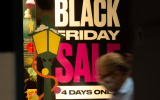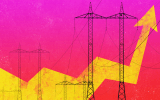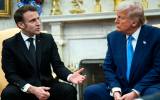
The US has sided with Russia to oppose a United Nations vote condemning the war on Ukraine on the third anniversary of the illegal invasion.
In a stunning shift in American policy, the US abstained from the UN General Assembly Resolution, which was backed by European nations and received 93 votes in favour.
The move put America on the same side as the war’s aggressor, Russia, leaving the US at odds with its longtime allies.
The vote on Tuesday (AEDT) came as French President Emmanuel Macron met US President Donald Trump at the White House and voiced his unwavering support for Ukraine.
Macron became the first European leader to visit Trump since he regained power, amid alarm in Europe about Trump’s hardening stance toward Ukraine and overtures to Russia.
Speaking alongside Trump, Macron said some European countries would be ready to have peacekeepers in Ukraine as a security guarantee after a peace treaty is signed, although they would not be sent to the front line.
He said the peace deal could come in a second phase, after what he called a “truce”.
Trump said he saw no problem with European troops being sent to Ukraine to serve as peacemakers.
He said the US was close to a minerals deal with Ukraine as he and Macron held talks that covered the prospects for ending the war.
Trump described the highly anticipated revenue-sharing agreement with Ukraine as “very close” in answering questions as he and Macron met in the Oval Office.
He said he might meet Ukraine President Volodymyr Zelensky later this week or next week to seal the agreement.
“He may come in this week or next week to sign the agreement, which would be nice,” Trump said of Zelensky.
Trump said he would also soon meet Russian President Vladimir Putin.
Asked if Ukraine should be willing to cede territory to Russia as part of a negotiated end to the war, Trump said “we’ll see” and noted that talks were just beginning.
Macron was at the White House for a morning session that lasted an hour and 45 minutes, including both leaders participating in a video conference with other G7 leaders about Ukraine.
British Prime Minister Keir Starmer will visit Trump later in the week.
It came after Trump recently opened dialogue with Putin, while engaging in a war of words with Ukraine’s President Volodymyr Zelensky.
Zelensky, fired back, saying Trump was living in a “disinformation bubble”.
Beyond the war of words, US officials opened direct talks with the Russian side in Saudi Arabia last week, shutting out Kyiv and Europe in an alarming change of policy on the war.

Also on Tuesday (AEDT), Zelensky told Western leaders of his hope to “finish this war this year, not in three” at a summit in Kyiv to mark the third anniversary.
Ukraine enters the fourth year of all-out war with Russia unsure it can rely any longer on its staunchest ally the US, as its exhausted troops fight to hold their ground against unrelenting enemy advances.
Washington has been clear it will not send troops as a security guarantee coveted by Kyiv if a peace deal emerges, placing the burden squarely on European powers that are likely to struggle without US backing.
Zelensky, who has told Europe to create its own army while urging Washington to be pragmatic, has held more than a dozen phone calls since Friday, mainly with European leaders, to scope out a way forward.
“Three years of resistance. Three years of gratitude. Three years of absolute heroism of Ukrainians. Proud of Ukraine!” he wrote on the Telegram messaging app, as foreign leaders began to arrive to mark the anniversary.
They included European Commission president Ursula von der Leyen, European Council President Antonio Costa and the leaders of Canada, Finland, Denmark, Norway and Sweden. They were met off the train by Ukraine’s foreign minister and Zelensky’s chief of staff.
Thousands of Ukrainian citizens have died and more than six million live as refugees abroad since Putin ordered the invasion by land, sea and air, starting the bloodiest conflict in Europe since World War II.
Military losses have been catastrophic, although they remain closely guarded secrets. Public Western estimates based on intelligence reports vary widely, but most say hundreds of thousands have been killed or wounded on each side.
Ukrainian troops face a numerically superior foe as questions swirl over the future of vital US military assistance.
Evhen Kolosov, head medic at an army stabilisation point for Ukraine’s Spartan brigade that is fighting in the east, said the troops were psychologically worn down.
“They’re fighting on but really those [who’ve been here] since the first days are tired, even more psychologically than physically, in the same way as medics. It’s difficult, but this is war, who said it would be easy?”
-with AAP










